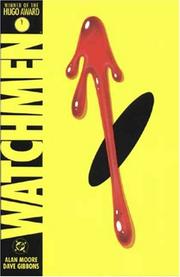Tuhnsoo reviewed Watchmen by Alan Moore
Review of 'Watchmen' on 'Goodreads'
4 stars
Better than the movie

Paperback, 424 pages
English language
Published Oct. 1, 1987 by Titan Books Ltd.
[Comment from Lauren Beukes][1]:
It took me years to read Watchmen. Every time I'd get to the men in tights and the giant naked blue guy, I'd think, "Ack! Superhero comic!" and put it down again. It wasn't that I was against comics. I'd read 2000AD Monthly religiously since 1989 and Alan Moore's The Ballad of Halo Jones, about a girl from an interplanetary ghetto who wanted to get "out", was my favourite series of all. But I liked the dark, twisty stuff that had something to say about the world and superhero comics seemed tediously codified with no room for moral ambiguity. I should have known better. What Moore does best, even at his silliest or most obtusely philosophical, is subvert. He uses story to crack open the dark places of the human soul like a crab shell, revealing the pasty meat within, and then pokes it with a …
[Comment from Lauren Beukes][1]:
It took me years to read Watchmen. Every time I'd get to the men in tights and the giant naked blue guy, I'd think, "Ack! Superhero comic!" and put it down again. It wasn't that I was against comics. I'd read 2000AD Monthly religiously since 1989 and Alan Moore's The Ballad of Halo Jones, about a girl from an interplanetary ghetto who wanted to get "out", was my favourite series of all. But I liked the dark, twisty stuff that had something to say about the world and superhero comics seemed tediously codified with no room for moral ambiguity. I should have known better. What Moore does best, even at his silliest or most obtusely philosophical, is subvert. He uses story to crack open the dark places of the human soul like a crab shell, revealing the pasty meat within, and then pokes it with a cattleprod to see it writhe.
He's the kind of writer who makes you feel very smart (Kitty Genovese and the moral bankruptcy of crowds in Watchmen, for example) and very stupid (a dozen obscure Victorian literature references interwoven into every page of League of Extraordinary Gentlemen) at the same time. He pushes the medium. Every panel, every background detail, every interlude, whether a vaudeville song or a beat-style short story or seemingly wholly unrelated pirate horror comic, counts. He stretches the boundaries of storytelling in ways other writers wouldn't attempt, let alone pull off – and does it with a ferocious social conscience that challenges everything we are.
And when he has a mind to, when he's not off on some grand mal meditation on the nature of magic or sexual desire or what stories mean, Moore tells the perfect story. Inventive. Surprising. Original. Utterly devastating. From being the comic I couldn't read, Watchmen became the narrative I hold up as what fiction can be.
[1]: www.guardian.co.uk/books/2011/may/14/science-fiction-authors-choice
Better than the movie